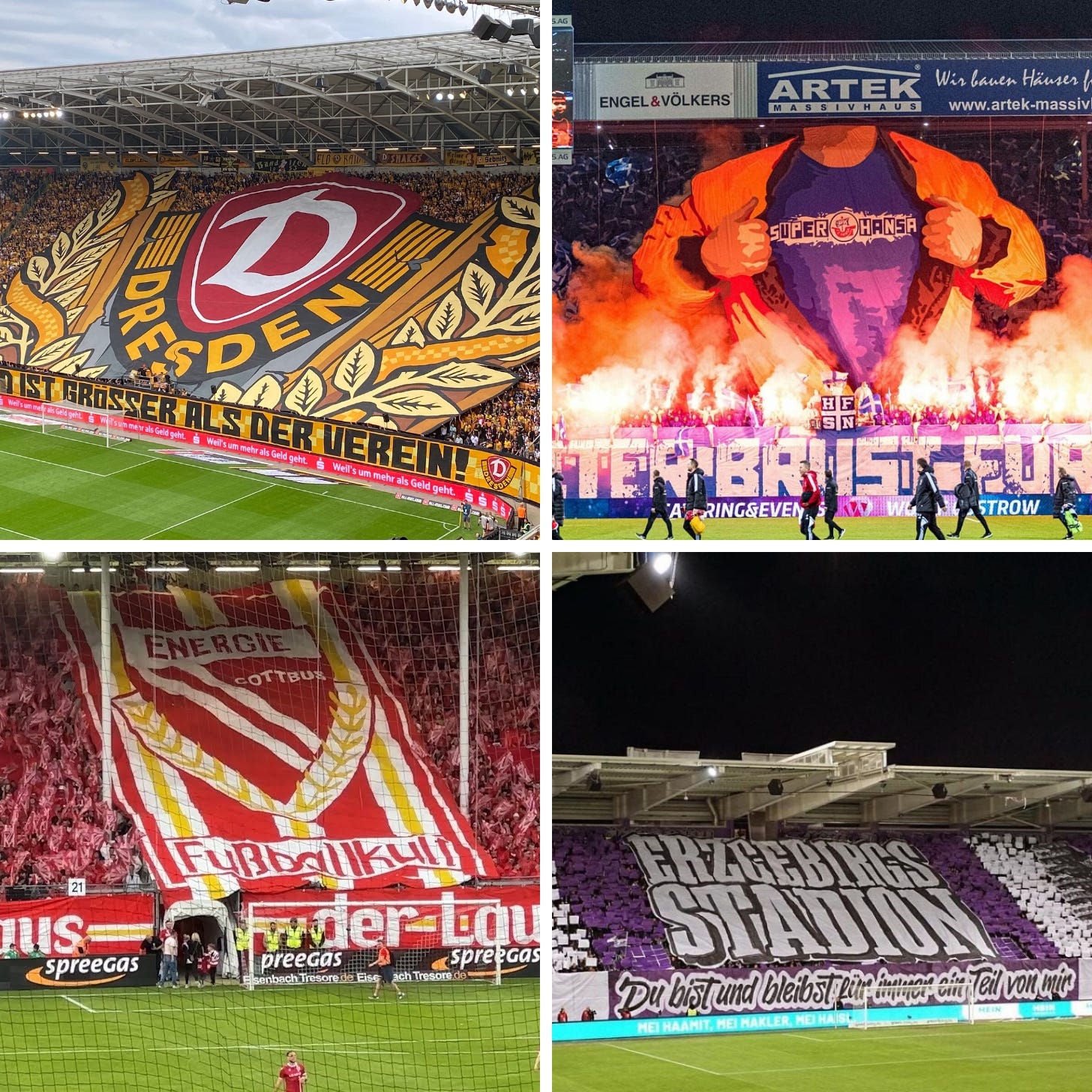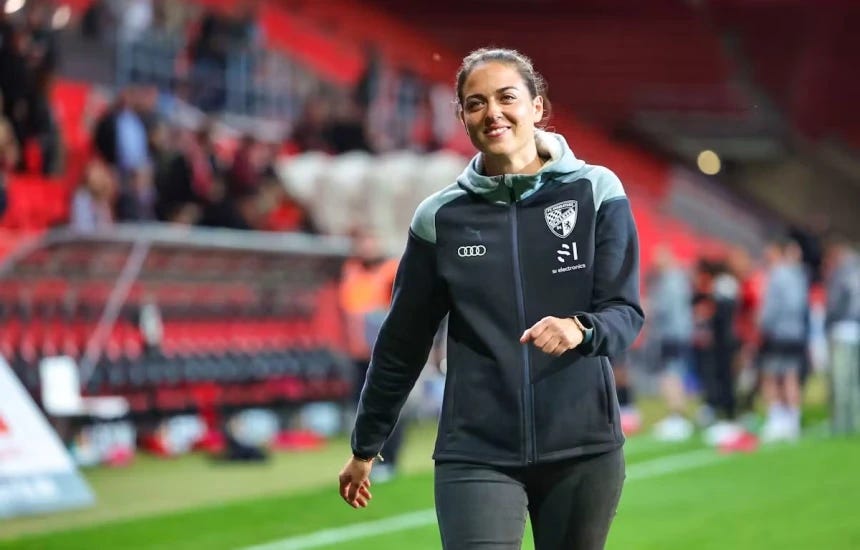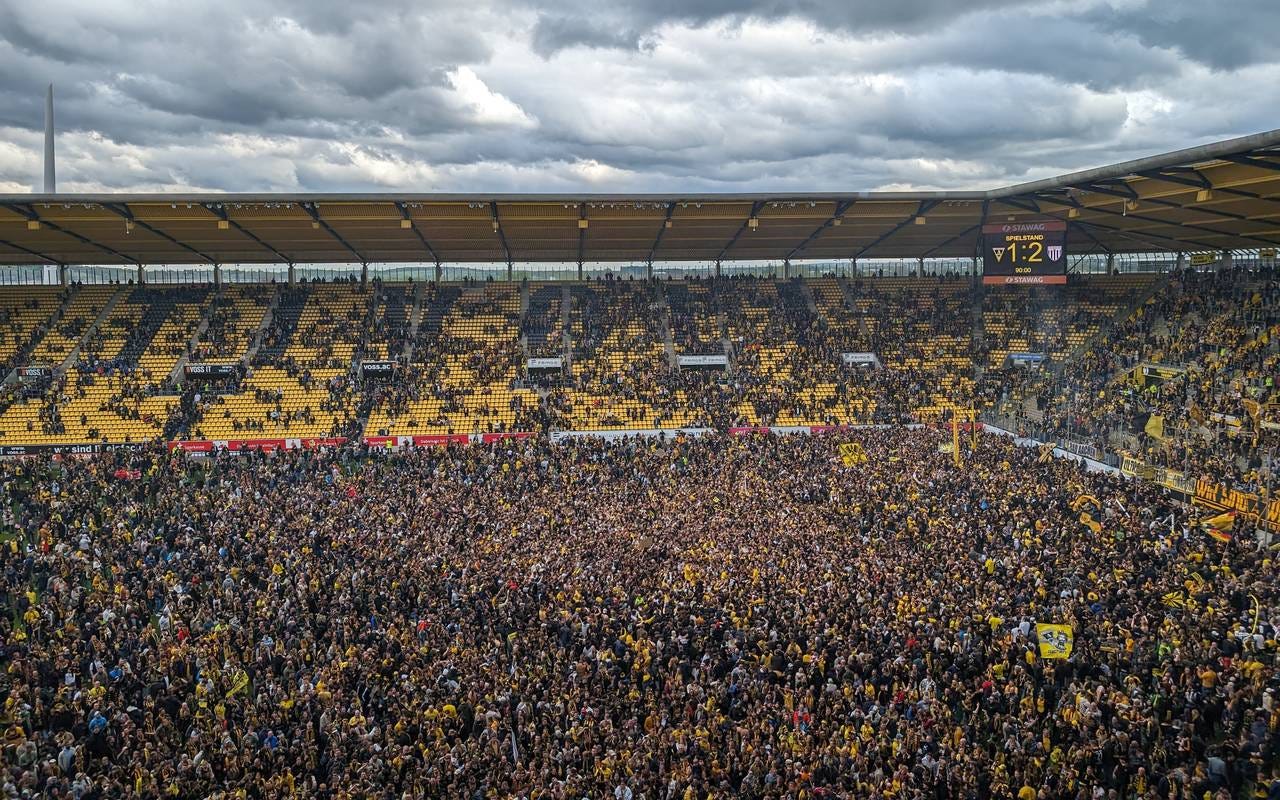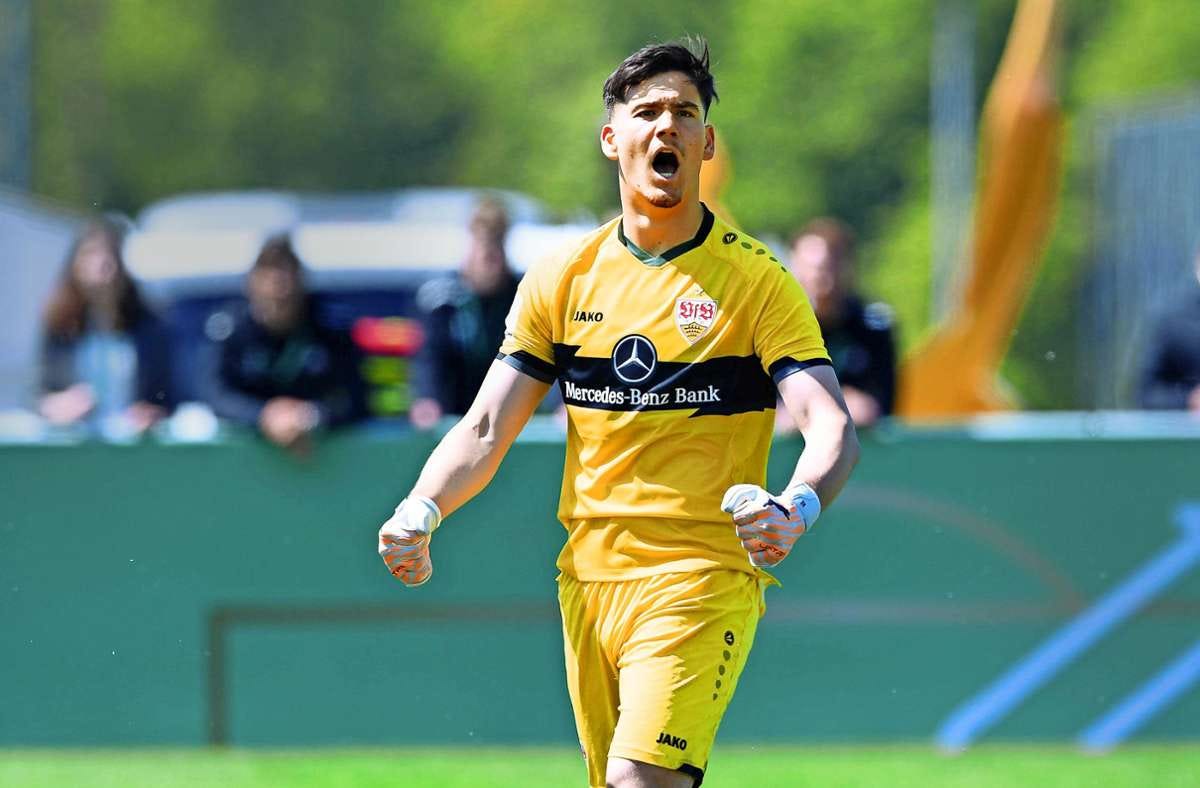Tradition, Talent, & Fierce Competition: A Special for the German 3. Liga
Tradition, Talent, & Fierce Competition: A Special for the German 3. LigaFiercely competitive & rich in tradition, the German 3. Liga offers a fascinating blend of modern innovation and finely-preserved football heritage. Here is why you need to tune in this season!Fiercely competitive, rich in tradition, and a vital breeding ground for the next generation of German talent - the 3. Liga (3rd division) offers a fascinating blend of modern innovation and finely-preserved football heritage. The competition embodies the unique heart and soul of German football, where an enduring passion for the sport thrives despite the many existential challenges faced by its clubs. The long journeys, minimal revenues, and the ever-present fear of relegation to the amateur divisions have sparked debates about overhauling the national structure in recent years. Yet, despite these limitations, the 3. Liga remains a vibrant and compelling competition with so much to offer. In this article, I explore four compelling reasons to tune into the German third division this season, uncovering the unique elements that make it a must-watch for football enthusiasts. From historic rivalries and passionate fan bases to the rise of trailblazing figures in management and officiating, the 3. Liga promises an exhilarating season brimming with stories that encapsulate the essence of football's unparalleled significance in German society. Breaking Down BarriersIn the lower leagues, where the margin between success and failure is extraordinarily slim, finding creative solutions to gain a competitive edge is of paramount importance. One club that is breaking down pre-existing barriers to create such an edge is FC Ingolstadt. 'Die Schanzer' have become the first club in Germany’s professional football pyramid to appoint a female head coach. Sabrina Wittmann, initially an interim solution last May, impressed with her tactical competency, ability to unite a locker room and on-pitch performances. Her success made the decision to give her the full-time job this season an easy one. Wittmann didn't lose any of her three matches as an interim coach in last season’s 3. Liga and even managed to lift silverware after defeating Würzburger Kickers in the Landespokal Bayern. Like many female managers, Wittmann has taken a long and arduous route to a job that many male counterparts have traditionally taken for granted. Wittman has operated as a coach at FC Ingolstadt for almost a decade, rising from the Ingolstadt under-10s all the way to the first team. Her journey is a fascinating account of commitment and persistence. FC Ingolstadt’s Managing Director, Dietmar Beiersdorfer, highlighted Wittmann’s unique qualities in a glowing appraisal following her appointment as a full-time coach in early June: “Sabrina Wittmann has impressively demonstrated during her time in Ingolstadt that she not only has the ability to nurture young players but also to sustainably develop teams, unlock their full potential, and lead them to success. She has proven this over the years, both in the youth sector and recently with the professionals.” Beiersdorfer's clear endorsement is further backed by his actions. As Wittmann has yet to acquire the necessary UEFA Pro license to coach in one of Germany’s professional leagues, Ingolstadt must pay a €3,500 fine for every match she spends on the sidelines. However, Beiersdorfer is willing to make these payments if Wittmann’s managerial success continues. It’s been only five matches to date, but for the time being, Sabrina Wittmann, and female managers as a whole, remain undefeated in German professional football! It's not just the clubs that are thinking outside the box; the DFB (German Football Federation) is also using the 3. Liga as a platform to promote new faces in the refereeing role. Among the 62 officials in Germany’s top three tiers, Fabienne Michel stands out as the only female official this season. The 29-year-old made her 3. Liga debut last season and is now a designated member of the 23-member team officiating this campaign. Michel, who is currently pursuing her Master's degree in Auditing, Taxation, and Finance, dreams of a full-time career in football. She already officiated last season’s Frauen DFB Pokal final in front of 45,000 spectators and is a regular fixture on the female international circuit. Alongside Michel, Assad Nouhoum is also breaking barriers as German football’s only Black referee in the professional pyramid. In 2017, Nouhoum was still pursuing a career as a player, but the now 28-year-old is fulfilling his professional dream in the unconventional role of an official. Nouhoum even made his 2. Bundesliga debut last season under unique circumstances. Nouhoum started a match between FC Nürnberg and Fortuna Düsseldorf as the fourth official but was forced into the spotlight in the 23rd minute after referee Richard Hempel was forced off with an injury. Nouhoum's impressive officiating has seen him swiftly rise from Germany’s amateur to professional divisions, and his active stance against racism and discrimination have made him a key role model for those who dream of an unconventional path into professional football. In an eye-opening interview with the Bayerischer Football Federation two years ago, Nouhoum shared his personal experiences: "I have personally experienced racism repeatedly. As a player, as a referee, but also in everyday life. Racism exists not only in football but in every area of life. And that is precisely why we must not downplay the issue and must actively do something about it. Communication is a key element. You have to reach out to people, talk to them, raise their awareness, inspire, and motivate them. This is where I want to make a contribution." Nouhoum's proactive engagement has even been acknowledged by the DFB, who honored him with "The Remarkable Path" award in 2022. This award recognizes individuals in football who advocate for more respect and demonstrate civil courage. East German SignificanceEast German football has historically been overlooked and undermined in post-unification Germany. No East German club has ever won the Bundesliga, and only 7 of Germany’s 56 professional clubs this season come from the former East German bloc. With 1. FC Magdeburg as the only DDR-Meister in Germany’s top two tiers, it is Germany’s 3. Liga where the historic East German matchups and derbies will be contested next season. The 2024/25 3. Liga features four historic clubs from the former East German DDR-Liga (1948-1991): Dynamo Dresden, Hansa Rostock, Energie Cottbus, and Erzgebirge Aue. Dynamo Dresden was the second most successful club in the league’s history with eight titles, but Hansa Rostock and Erzgebirge Aue (then called SC Wismut Karl-Marx-Stadt) also won league titles on various occasions. A lack of investment, a sense of isolation, and Germany’s general economic shift to the West have left the former East German giants struggling outside the Bundesliga. However, the passion for football remains steadfast in these historic clubs. Despite playing in the third tier last season, Dynamo Dresden recorded an average attendance of 28,751. That was higher than six of the 18 Bundesliga teams managed! Energie Cottbus, playing one division lower in the Regionalliga Nord-Ost (4th tier), still drew thousands to the LEAG Energie Stadion each matchday, with 139,618 fans attending 17 home matches. Even a relegation campaign didn't deter Hansa Rostock’s supporters from filling the Ostseestadion, averaging 25,974 fans per home game in last season’s 2. Bundesliga.  The fantastic choreos & terrace culture are some of the most interesting aspects to follow amongst the East German clubs this season It’s true that these clubs still have a problematic terrace culture that continues to accept fascism, sexism, and racism in a relatively unchecked manner. A disgusting Hansa banner from last season even seemed to celebrate the 1992 Lichtenhagen attacks; the largest racially and xenophobically motivated attacks in Germany since the end of World War II! However, it’s crucial not to paint an entire fanbase with the same brush and to understand the highly combustible cultural context. These East German fanbases have navigated a volatile post-unification Germany, which has often overlooked their unique circumstances in national and political decisions. This is not to excuse the often deplorable actions but to place them in a context that helps viewers appreciate and preserve the valued aspects of East German terrace culture while working to eliminate its more reprehensible elements. Packing the TerracesThe East German giants may be leading the way in atmosphere and attendance next season, but across the league, there are massive clubs that embody Germany’s vibrant fan culture. A prime example is newly promoted Alemannia Aachen. In 2006, Aachen’s 33,000-seater Tivoli was a venue for the World Cup in Germany, and as late as 2012, the West-German outfit hosted 2nd-tier football. However, a sharp decline saw Aachen flounder in the regional 4th tier since 2014, even flirting with insolvency on countless occasions. Nevertheless, last season the dream of professional football was finally realized, and fans came out in droves as Aachen stormed through the Regionalliga West. A total of 335,034 fans watched the club play 17 home matches against unattractive opposition like Fortuna Düsseldorf’s U23s and FC Bocholt. In the penultimate league match, Aachen even set a new Regionalliga record as 31,034 fans celebrated the league title with a pitch invasion that looked even livelier than Bayer Leverkusen’s Bundesliga celebrations a few weeks earlier. Alongside Aachen, three other important clubs stand out in terms of stadium atmosphere: Arminia Bielefeld, Rot-Weiss Essen, and 1860 Munich. Just over two years ago, Arminia Bielefeld competed in the Bundesliga, but back-to-back relegations have pushed the side to the brink of amateur football, with their first campaign in the 3. Liga ending just 6 points ahead of the relegation zone. This on-field demise hasn’t kept fans away; in fact, it had the opposite effect. More fans than ever came out to support their local club in a time of existential need. While Bielefeld averaged 16,770 fans per match in their final Bundesliga season, last season’s 3. Liga saw an average of 18,640 fans filling the SchücoArena each matchday. It's been almost 50 years since Rot-Weiss Essen played in the Bundesliga, but like Bielefeld, they too can rely on a loyal fanbase that follows the side through thick and thin. Promoted to the 3. Liga in 2022, Essen quickly became one of the most followed sides in the division. Over 300,000 fans attended matches at the Stadion an der Hafenstraße last season, with Essen selling out over 80% of their 20,000-seater stadium every matchday. Finally, 1860 Munich is among the clubs in German football with one of the richest histories. Die Löwen were one of the 16 founding members of the Bundesliga and won the third-ever Bundesliga title in 1965/66. However, relegations, the rise of city rivals Bayern Munich, and the tumultuous reign of 1860 owner Hasan Ismaik have left the historic club struggling on the brink of disaster. The days of Abedi Pele and Davor Šuker are long gone, but fans still come out in droves to watch their side at its traditional home, the Grünwalder Stadion. Opened in 1911, the stadium has a rustic and traditional feel with a worn exterior and 60% standing capacity. But, it is a true home for a fanbase that has been through hell over the past decade. Last season, all 19 home matches at the Grünwalder Stadion were sold out, with 15,000 fans packing the terraces despite the team’s floundering performances on the pitch. 1860 were one of only 3 sides outside the Bundesliga to sell out every home match last campaign, and this season is off to a similar start with another 15,000 watching the side’s opening day defeat to FC Saarbrücken. A Talent PipelineThe financial constraints inherent in lower-league football often compel clubs to forgo costly, experienced signings in favor of nurturing young talent taking their first steps in senior football. The 3. Liga exemplifies this model, boasting an average age of 24.5 years to make it the youngest among Germany’s top three tiers. A significant factor contributing to this youthful dynamic is the inclusion of U23 teams. For the first time since the 2015/16 season, three U23 teams will compete in the upcoming 3. Liga season: Borussia Dortmund II, Hannover 96 II, and VfB Stuttgart II. The inclusion of U23 teams in the 3. Liga is a highly contentious issue, sparking frustration nationwide. Matches featuring these teams often draw minimal crowds, and U23 outfits take up a 3. Liga spot that could have gone to one of the numerous historic clubs struggling for survival in the regional amateur tiers. Additionally, if these U23 teams face relegation threats, they have the advantage of calling upon first-team players with extensive professional experience to secure an unfair advantage in a contest for survival. The calls for a designated U23 division are growing louder, but for fans eager to watch some of Europe's brightest young talents, the inclusion of Dortmund, Hannover, and Stuttgart II adds an intriguing element to this season's 3. Liga. Elite European stars like David Alaba, Jamal Musiala, and Joshua Zirkzee, as well as numerous Bundesliga veterans such as Marvin Ducksch, Pascal Stenzel, and Kevin Stöger, began their professional careers in the 3. Liga with U23 teams. While it’s challenging to predict if anyone from the current crop will achieve similar success, several promising candidates stand out. Dennis Seimen (2005) and Samuele Di Benedetto (2005) are highly-rated German youth internationals likely to play pivotal roles in Stuttgart’s bid for survival. Seimen is an exceptional shot-stopper with cat-like reflexes, while Di Benedetto is an intelligent playmaking midfielder who impressed during the first team’s pre-season tour of Japan. In Hannover, keep an eye on Tom Sanne (2004) and Eric Uhlmann (2003). Sanne was the top goalscorer in the Regionalliga Nord last season with 24 goals in 32 matches for HSV II, and Uhlmann is a competent ball-playing centre-back already knocking on the first team’s door. In Dortmund, look out for top talents Cole Campbell (2006) and Paris Brunner (2006). The pair can still play under-19 football but are clearly up to the challenge at senior level. These U23 teams aren’t the only ones putting their faith in youth, however. SpVgg Unterhaching is another prime example. This South German outfit, hailing from a tiny Bavarian municipality of 22,000, has a proven track record of developing talent. The reigning Bundesliga 2 top goalscorer Robert Glatzel came through their academy, as did Union Berlin midfielder Janik Haberer and German international Karim Adeyemi. Last season, Unterhaching’s faith in their youth academy was instrumental in surviving the first campaign back in the professional pyramid. The Bavarian club offered more minutes to U21 players than any other side in German football, with three top talents - Benedikt Bauer, Aaron Keller, and Maurice Krattenmacher - moving to 2. Bundesliga clubs this off-season. Instead of using new funds to attract experienced 3. Liga campaigners, Unterhaching have doubled down on their youthful strategy. Their squad enters the new season with an average age of 22.1 years, and nine of their 15 new signings are under the age of 21. Key players to watch include Konstantin Heide (2006) and Gibson Nana Adu (2008). 18-year-old Heide was a World Cup winner with Germany’s under-17s in December and is the youngest starting goalkeeper in Germany’s top 3 tiers. Gibson Nana Adu, on the other hand, overtook David Alaba as the youngest player to ever score in the 3. Liga when he found the net against VfL Lübeck last season at the age of 16 years, 1 month, and 30 days. You're currently a free subscriber to The German Football Weekly. For the full experience, upgrade your subscription. |
Older messages
The Ultimate 24/25 Zweite Bundesliga Preview
Friday, August 2, 2024
In mere hours, a brand new season of the Zweite Bundesliga will be upon us. Who will succeed, who will fail, and what other twists and turns the 50th season has in store is all explored today! ͏ ͏ ͏ ͏
10 Young Talents to Watch in the 2024/25 2. Bundesliga
Friday, July 26, 2024
The historic fixtures are the biggest attraction in the 2. Bundesliga, but following closely behind is the opportunity to see some of the most promising young talents in Europe showcase their talents!
EURO 2024 Final Preview
Sunday, July 14, 2024
After 30 days, the EURO 2024 final is upon us. At the Olympiastadion in Berlin Spain will face England in a fascinating encounter between two sides desperate to lift the Henri Delaunay trophy. ͏ ͏ ͏ ͏
EURO Matchday 21 Preview
Thursday, July 11, 2024
One more spot is available for a place in the final. Can Netherlands book their place for the first time since 1988? Or will England avenge themselves for their final defeat in 2021? ͏ ͏ ͏ ͏ ͏ ͏ ͏ ͏ ͏
EURO Matchday 20 Preview
Tuesday, July 9, 2024
The EURO 2024 Semi-Finals are here. Can Spain continue their dominant display with another victory? Or will France make it to an international final for the 4th time in the past decade? ͏ ͏ ͏ ͏ ͏ ͏ ͏ ͏
You Might Also Like
Hope's a good start for Golden State
Friday, February 28, 2025
Stephen Curry is fading just slightly, but maybe there's still enough for another magical run. ͏ ͏ ͏ ͏ ͏ ͏ ͏ ͏ ͏ ͏ ͏ ͏ ͏ ͏ ͏ ͏ ͏ ͏ ͏ ͏ ͏ ͏ ͏ ͏ ͏ ͏ ͏ ͏ ͏ ͏ ͏ ͏ ͏ ͏ ͏ ͏ ͏ ͏ ͏ ͏ ͏ ͏ ͏ ͏ ͏ ͏ ͏ ͏ ͏ ͏ ͏
Icy and spicy
Friday, February 28, 2025
Drop the mic
The Eve of March (The Next Chapter)
Friday, February 28, 2025
March Madness is the next sports phenomenon, and we'll still be here to track the brackets...
All-Star Debate & Daytona Repeat 🏁
Thursday, February 27, 2025
NBA All-Star Flop. NHL 4 Nations Excitement. Byron Repeats Daytona. NCAA Hoops & More...
It's not the basketball that's broken
Thursday, February 27, 2025
NBA All-Star needs more All-Stars and less of everything else. ͏ ͏ ͏ ͏ ͏ ͏ ͏ ͏ ͏ ͏ ͏ ͏ ͏ ͏ ͏ ͏ ͏ ͏ ͏ ͏ ͏ ͏ ͏ ͏ ͏ ͏ ͏ ͏ ͏ ͏ ͏ ͏ ͏ ͏ ͏ ͏ ͏ ͏ ͏ ͏ ͏ ͏ ͏ ͏ ͏ ͏ ͏ ͏ ͏ ͏ ͏ ͏ ͏ ͏ ͏ ͏ ͏ ͏ ͏ ͏ ͏ ͏ ͏ ͏ ͏ ͏ ͏ ͏ ͏
Magic B-Ball in The Mitten 😤
Thursday, February 27, 2025
Michigan State's Hail Mary. Pistons Win 8th Straight. NFL Combine. Japan Beats USA & More...
Elias Baum
Thursday, February 27, 2025
Elias Baum is a highly promising German youth international who has enjoyed a breakout season in senior football. The 19-year-old fullback could finally be the answer to Germany's rightback woes. ͏
New Star, Rematch & TGL's Moment
Thursday, February 27, 2025
Vandy's Mikayla Blakes Has Arrived. USA-CAN 4 Nations Rematch. TGL's Tripleheader & More...
Hoopin’ Around: 10 Days to March 🏀
Thursday, February 27, 2025
NCAA Scoreboard & Storylines. Champions League KOs. NFL Free Agent Targets & More...
Float like a butterfly, sting like a bee
Thursday, February 27, 2025
It doesn't get better than this


